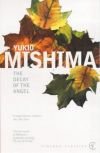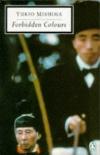
Sun and Steel: Art, Action and Ritual Death is a book by Yukio Mishima. It is an autobiographical essay, a memoir of the author's relationship to his body. The book recounts the author's experiences with, and reflections upon, his bodybuilding and martial arts training. The book was first published in 1968, gathering …

Acts of Worship is a 1965 short story collection by the Japanese writer Yukio Mishima. The title story is the tale of a Professor's visit to three Kumano shrines, accompanied by his shy submissive middle-aged housekeeper, and his reasons for doing so. The collection was translated into English by John Bester.

Thirst for Love is a 1950 novel by the Japanese writer Yukio Mishima. The word "kawaki" literally means thirst, but has a sense of parched dryness associated with it. The title of the movie version has also been translated as Longing for Love. Thirst for Love is Mishima's third novel, following the immensely …

The Temple of Dawn is the third novel in the Sea of Fertility tetralogy by the Japanese writer Yukio Mishima. For this as for the other novels in the series, Mishima travelled to various places to conduct research, including Wat Arun in Bangkok, Thailand.

Recognized throughout the world for his brilliance as a novelist and playwright, Yukio Mishima is also noted as a master of the short story in his native Japan, where the form is practiced as a major art. Nine of Yukio Mishima’s finest stories were selected by Mishima himself for translation in this book; they …

The Decay of the Angel is a novel by Yukio Mishima and is the fourth and last in his Sea of Fertility tetralogy.

Forbidden Colors is a 1951 novel by the Japanese writer Yukio Mishima, translated into English in 1968. The name kinjiki is a euphemism for homosexuality. The kanji 禁 means "forbidden" and 色 in this case means "erotic love", although it can also mean "color". The word "kinjiki" also means colors which were forbidden …

 English
English Español
Español Deutsch
Deutsch


